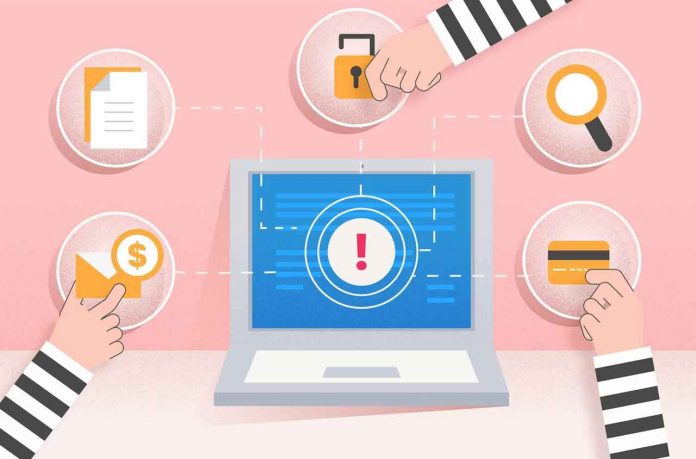While financial scams have been around for a while, they are growing more prevalent in the Internet era. Because of technology, scammers may now target you from anywhere in the globe; they do not need to be local.
They are also becoming more cunning about it, coming up with inventive new methods to dupe trusting individuals into disclosing crucial information. Nowadays, it’s becoming harder and harder to distinguish between real requests and those that aren’t.
You may not believe that you possess any highly sought-after knowledge. What makes hackers want to target you, then? Indeed, to avoid arousing any suspicions about their activities, fraudsters search for identities exactly like yours.
A fraudster might apply for mortgage loans or credit cards in your name using information about your identification (last name, first name, address, social security number, and bank information). The creation of a false passport or driver’s license might likewise be done using your identity.
Here Are Some Guidelines To Assist You in Avoid Financial Fraud
Use safe websites
As a general guideline, always submit personal information on secure websites while making transactions online. Check for the letters “https” at the beginning of the URL and a little lock in the address bar of your browser.
This will show that the website is protected. This is just as important if you want to take out a payday loan. Using NorthnLoans Quebec as an example, you can see what a secure cash withdrawal site looks like.
Keep an eye on your finances
Create a budget to aid in managing your debt and keeping your money in order. Don’t take on more debt than you can handle. Review your bank statements and credit report often.
Place a “fraud alert” or “freeze” on your credit report if you have experienced identity theft, given any financial or personally identifying information with a stranger or on an unsafe website, or unknowingly made a transaction from a phony online merchant.
Always double-check registration before providing anybody with your details or money
A corporation is not necessarily governed by New SRO just because it makes that claim.
Keep your money and personal information secure
Don’t write down your banking passwords, and change them often. Don’t use your credit card on unreliable websites, and keep your credit card and credit card details secure. Never provide any of your personal or financial information, including your SIN, unless you are certain of the purpose for doing so. Know who is authorized to ask you for your SIN or credit history, and only provide this information when it is essential.
Always be sure the person who calls or emails you are who they say they are
The identity provided is often the name of a registered person, and the fraud is only made known by a fake phone number or email address.
Verify URLs and email addresses twice
The ability of scammers to trick consumers into clicking on harmful links is improving. To gain your confidence, they pretend to be officials from the government or representatives of other organizations. They often enstill a feeling of urgency to get you to click on a link without carefully reading it.
Make sure URLs and email addresses are real by carefully reading them. If you’re uncertain, get in touch with the business or government body directly to find out whether they sent you a correspondence. Always be skeptical of communications like this since banks and government organizations don’t normally send emails or texts that aren’t secure.
Never set up applications that provide direct access to your computer or remote access
Only after you’ve verified their registration should you provide a company or dealer access to any personal information!
Keep your mobile and laptop devices secure
Never allow anybody who isn’t an authorized service technician or someone you didn’t contact for service or repair to have physical or virtual access to your devices. Your gadgets could store login information, passwords, or other sensitive data that scammers might access and abuse. Before selling or destroying old computers or cell phones, always erase your gadgets by returning them to their original settings.
Keep yourself educated about money theft and scams
You may prevent being a victim of scams by being aware of certain scam kinds and comprehending the basic strategies that con artists use. In the 2020 year, 30% of people who reported the fraud to the BBB said they did not lose money because they were aware of the scam.
If you want to apply to a bank or take a loan, then also study the lists of trusted lenders and companies. Every year, financial institutions introduce new protections for their customers. This is why 87% of Canadians trust their bank to protect their personal information. But you should always be careful and check your lender several times.

Actions To Take After Being Frauded
The first thing to do after being conned, according to the Canadian Anti-Fraud Centre (CAFC), is to “gather your thoughts” and “remain cool.”
Every piece of information concerning the scam, including papers, receipts, and copies of emails or text messages, should be gathered by people and corporations.
Fraud victims should next report the occurrence to their financial institution so that the account may be reported and the passwords updated. The CAFC requests that consumers report fraud to the CAFC and the credit agencies Equifax and TransUnion.
Companies need to have a fraud response strategy. Usually, the best course of action is to look into what occurred, how it happened, and how to stop it from occurring again.
Conclusion
In summary, financial fraud is a serious risk that may affect everyone. Hackers and fraudsters are always hunting for identities to utilize in their financial fraud schemes.
But, there are steps you can take to safeguard yourself from financial fraud, such as monitoring your accounts, safeguarding your data, and exercising caution while disclosing personal data online.
If you fall victim to financial fraud, it’s important to maintain your composure and acquire as much information as you can so that you may report the theft to the appropriate authorities. You may lower the danger of financial fraud and safeguard your financial security by exercising care and implementing essential safety measures.







